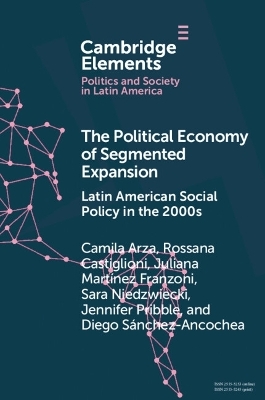
The Political Economy of Segmented Expansion
Latin American Social Policy in the 2000s
2022
Cambridge University Press (Verlag)
978-1-009-34411-1 (ISBN)
Cambridge University Press (Verlag)
978-1-009-34411-1 (ISBN)
This Element shows that Latin America's social policy gains in the early 2000s remained segmented, exhibiting differences in access and benefit levels, gaps in service quality, and unevenness across policy sectors. It argues that this segmented expansion resulted due to the characteristics of democracy, economic conditions, and policy legacies.
The early 2000s were a period of social policy expansion in Latin America. New programs were created in healthcare, pensions, and social assistance, and previously excluded groups were incorporated into existing policies. What was the character of this social policy expansion? Why did the region experience this transformation? Drawing on a large body of research, this Element shows that the social policy gains in the early 2000s remained segmented, exhibiting differences in access and benefit levels, gaps in service quality, and unevenness across policy sectors. It argues that this segmented expansion resulted from a combination of short and long-term characteristics of democracy, favorable economic conditions, and policy legacies. The analysis reveals that scholars of Latin American social policy have generated important new concepts and theories that advance our understanding of perennial questions of welfare state development and change.
The early 2000s were a period of social policy expansion in Latin America. New programs were created in healthcare, pensions, and social assistance, and previously excluded groups were incorporated into existing policies. What was the character of this social policy expansion? Why did the region experience this transformation? Drawing on a large body of research, this Element shows that the social policy gains in the early 2000s remained segmented, exhibiting differences in access and benefit levels, gaps in service quality, and unevenness across policy sectors. It argues that this segmented expansion resulted from a combination of short and long-term characteristics of democracy, favorable economic conditions, and policy legacies. The analysis reveals that scholars of Latin American social policy have generated important new concepts and theories that advance our understanding of perennial questions of welfare state development and change.
1. Introduction: taking stock of Latin America's expansionary phase; 2. Latin America: historical problems, recent expansion; 3. Conceptualizing and measuring social policy expansion: perspectives from the literature; 4. The character of policy change: segmented expansion; 5. Explaining segmented expansion: democracy, the boom, and policy legacies; 6. Explanatory factors that deserve further study; 7. Social policy after the expansionary era – what's next?; 8. Conclusion: what we have learned as a compass for the future; References.
| Erscheinungsdatum | 28.11.2022 |
|---|---|
| Reihe/Serie | Elements in Politics and Society in Latin America |
| Zusatzinfo | Worked examples or Exercises |
| Verlagsort | Cambridge |
| Sprache | englisch |
| Maße | 152 x 228 mm |
| Gewicht | 140 g |
| Themenwelt | Sozialwissenschaften ► Politik / Verwaltung ► Politische Systeme |
| Sozialwissenschaften ► Politik / Verwaltung ► Staat / Verwaltung | |
| Sozialwissenschaften ► Soziologie | |
| Wirtschaft ► Volkswirtschaftslehre ► Wirtschaftspolitik | |
| ISBN-10 | 1-009-34411-0 / 1009344110 |
| ISBN-13 | 978-1-009-34411-1 / 9781009344111 |
| Zustand | Neuware |
| Haben Sie eine Frage zum Produkt? |
Mehr entdecken
aus dem Bereich
aus dem Bereich
über Alltagsorte des sozialen Zusammenhalts
Buch | Softcover (2024)
transcript (Verlag)
24,00 €


